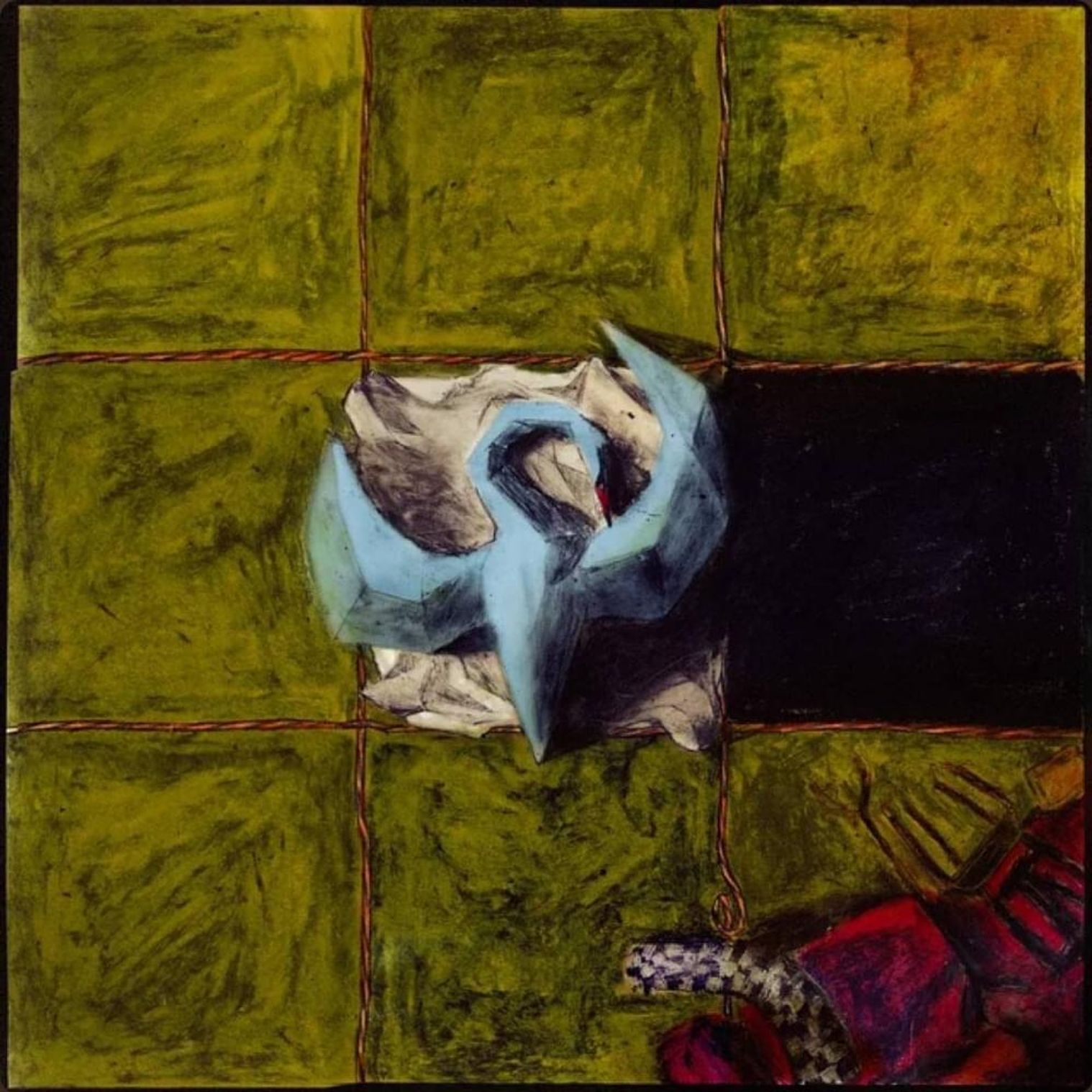The later, post-Optimus Prime death seasons of the original Transformers cartoon took place in the distant, futuristic year of 2006, when the Decepticons' most powerful weapon was Trypticon, an actual city that would transform into a vast purple-and-black dinosaur. Trypticon spent a lot of time fighting against Metroplex, an Autobot city that would also turn into a robot. During one episode -- and I had to Google this to make sure I hadn't imagined it as a kid -- Trypticon actually steals the Eiffel Tower for some reason. (Transformers got weird toward the end.) It's presumably pure coincidence that the Swiss extreme-metal originator Tom Gabriel Fischer gave his latest band an almost-identical name to Trypticon, as I've interviewed Fischer, and he did not strike me as the sort of person who has much time in his life for American cartoons from the '80s. Fischer is a deathly-serious type, someone who seems to spend the better part of his days plumbing the depths of his own depression, mining his soul for anything he can shape into his dark art. (Supposedly, Fischer's Triptycon is a play on the word "triptych," since it's his third major musical project.) And yet listening to Melana Chasmata, Triptykon's sophomore album, I can't help thinking about the Transformer Trypticon, about a lumbering and malevolent beast so humungous that its mere scale can fire a kid's imagination. Triptykon's music lunges and stomps and churns like an avenging futuristic/prehistoric beast, and Melana Chasmata almost feels like it doesn't belong on this planet. It's too huge, too bloodthirsty, to exist.
As a teenager in Switzerland, Fischer helped to invent black metal. Taking the utterly badass stage name Tom G. Warrior, Fischer led (the also awesomely named) Hellhammer, who cranked out about one album's worth of music in their three years of early-'80s existence, playing faster and louder and meaner and more mercilessly than just about every other band of their era. Fischer says that Hellhammer were laughed at in their homeland, but metalheads today speak of them in hushed tones. After that, Fischer and his bandmate Martin Ain formed Celtic Frost, maybe the weirdest and most adventurous band on the '80s speed-metal underground. Celtic Frost would tour with bands like Anthrax, and could do the fast growling lurch that their contemporaries were working, but they also worked in all sorts of oblique ideas: Neoclassical strings, robo-funk bass slaps, opera-singer wailing. Their biggest moment might've come when they covered Wall Of Voodoo's new wave hit "Mexican Radio," which was not the sort of thing that badass underground metal bands were doing at the time. They attempted to sell out with the 1988 glam-metal move Cold Lake, failed miserably, and broke up a few years later.
But after farting around with industrial and ambient music for a while, Fischer got back together with Ain and reformed Celtic Frost in 2001, eventually putting together the heaving, spitting, face-ripping reunion album Monotheist. Monotheist is that rarest of beasts: The reunion album that's probably better than anything the band did during its original run. It fully internalizes all the way-out experimentation of Celtic Frost's original run, melting it all into one gooey, misanthropic whole. (A thing I can't recommend highly enough: Celtic Frost's video for the Monotheist track "A Dying God Coming Into Human Flesh," quite possibly the most metal video anyone has ever made.) But Celtic Frost broke up, for the second time, in 2007, just when they were at the height of their powers.(Fun fact: Fischer, when he's not taking metal apart and putting it back together in weird ways, works as the personal assistant of the great Swiss artist H.R. Giger, who was responsible for the Melana Chasmata cover art.)
And now we have Triptykon. Fisher's new band took off, more or less, where Celtic Frost left off with Monotheist, and their first album, 2010's Eparistera Daimones was a majestic blast of rage, reportedly driven by Fischer's anger at the way Celtic Frost ended. Melana Chasmata arrives now after years of work, a product of personal struggles that Fischer has declined to describe. But the new album feels fuller, grander, and more itself than its predecessor did. Triptykon's metal subgenre is gothic doom, but that combination of words feels too small to describe what Triptykon do on Melana Chasmata; it's more accurate to say that they built cavernous cathedrals out of sludge and filth.
Fischer's voice (and his signature "ooh! grunt) was probably the silliest thing about Celtic Frost back in the day, but that voice has grown fuller and deeper and more interesting as he's aged, and now it's got an old-god resonance to it. He uses it to gnash and roar but also to moan and imperiously intone. He sets that voice against guest singer Simone Vollenweider's elegant, placid new-age sigh, and the contrast works wonders. She sounds like an angel, and he sounds like some slithering beast that's crawled out of the abyss. The band's crunch is slow and deliberate, except when it isn't, and when it ratchets up the speed to near-thrash levels on "Breathing," the galloping thunder is enough to jolt you out of a trance. Fischer is an absolute perfectionist, and there's no wasted motion on Melana Chasmata; every sonic detail has a point a reason for being. The battering double-bass drumming on opener "Tree Of Suffocating Souls," for instance, isn't speed for speed's sake; it's underlies the brutally slow battering-ram guitars. "Altar Of Deceit" has a groove so slow and deep that it's almost funky in its Teutonic rage-out severity. "In The Sleep Of Death" is less like a song and more like an ancient incantation that could've only existed if the Druids had invented guitar distortion.
All the songs on Melana Chasmata are long and expansive, but the 12-and-a-half-minute "Black Snow" is the most epic of the epics here, a monolithic landscape that moves from one locked-in monster-groove to the next and builds to a fiery, demonic deathgaze climax that might make Deafheaven jealous. I've seen at least one review that takes the album to task for not ending with "Black Snow" instead of "Waiting," the song that brings the album to a close. But I call bullshit on that. "Waiting" is a piece of music that absolutely takes my breath away, a glint of dark beauty that reminds me of what metal can do like no song has in recent memory. "Waiting" starts out with Vollenweider cooing the word "dying" over and over, before an agonizingly slow bass-riff kicks in and everything finally flares up with grand, cruel assurance. As the song reaches its peak, Vollenweider and Fischer are both chanting "we are the same" -- her voice all high calm prettiness, his an echoing rasp-whisper -- repeating it enough time that beauty and ugliness feel like the same thing, like one melting whole. It's a song that leaves my head spinning, and it's a sign that Fischer, decades deep into his career, still has worlds left to conquer. May he conquer them all.
Melana Chasmata is out now on Prowling Death/Century Media.
Other albums of note out today:
• The Afghan Whigs' intense, cathartic reunion effort Do To The Beast.
• Duck Sauce's giddy, inventive, happily non-serious house-music party Quack.
• Aimee Mann and Ted Leo's bright, sharp power-pop super-duo self-titled debut as the Both.
• Woods' deeply satisfying psychedelic sprawl With Light And With Love.
• Arcadia, Chairlift leader Caroline Polachek's spacey electronic debut as Ramona Lisa.
• Jessica Lea Mayfield's brassy alt-country snarler Make My Head Sing...
• Odonis Odonis's busy post-hardcore bug-out Hard Boiled Soft Boiled.
• Thantifaxath's atmospheric black metal wallow Sacred White Noise.
• Amps For Christ's heavy and dark folker Canyons Cars And Crows.
• Shonen Knife's dependably sunny Overdrive.
• Deleted Scenes' all-over-the-place indie-pop exploration Lithium Burn.
• Horse Thief's spacey roots-rock debut Fear In Bliss.
• Fucked Up's Year Of The Dragon EP.
• DJ Tennis's Local EP.
• Factory Floor's How You Say remix EP.






